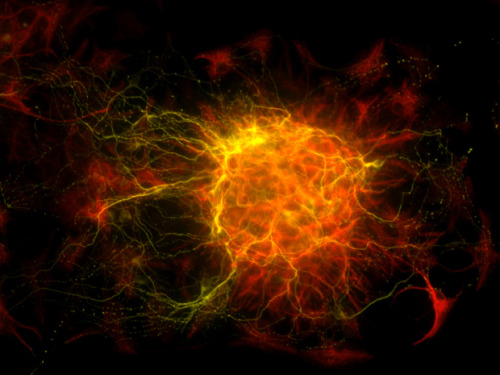Invincibleworld - Invincible World


More Posts from Invincibleworld and Others


Who doesn't love a good ole PAS stain?
Ft some lovely Cryptococcus organisms





If you think science isn’t beautiful, you are wrong. (All images courtesy of Cell Picture Show)

The Birth of Brain Cells
This might look like a distant web of galaxies captured by a powerful telescope, but it’s actually a microscopic image of a newborn nerve cell. The human brain contains more cells than there are stars in our galaxy, and the most important cells are neurons, which are nerve cells responsible for transmitting and processing electro-chemical signals at up to 320 km/h. This chemical signalling occurs through synapses—specialised connections with other cells, like wires in a computer. Each cell can receive input from thousands of others, so a typical neuron can have up to ten thousand synapses—i.e., can communicate with up to ten thousand other neurons, muscle cells, and glands. Estimates suggest that adult humans have approximately 100 billion neurons in their brain, but unlike most cells, neurons don’t undergo cell division, so if they’re damaged they don’t grow back—except, apparently, in the hippocampus (associated with memory) and the olfactory bulb (associated with sense of smell). The process by which this occurs is unclear, and this image was taken during a project to determine how neurons are born—it actually depicts newborn nerve cells in an adult mouse’s brain.
(Image Credit: Dana Bradford)

Candidatus Desulforudis audaxviator
The species name of this bacterium contains the Latin phrase Candidatus (candidate) due to the fact that the species record has not been published in a taxonomically valid manner. It is not associated with any family, order, or class, but is included as a candidate under the phylum Firmicutes.
Candidatus D. audaxviator is a unique species, isolated from the Earth's surface for millions of years and a loner in its ecosystem. These bacteria do not need sunlight or chemical energy for their food or metabolic processes, instead subsisting on radioactive energy for their needs. They are able to fix their own nitrogen and cannot survive in the presence of oxygen.
The species name, audaxviator, is taken from Jules Verne’s “Journey to the Center of the Earth,” and means “descend, bold traveler, and attain the center of the Earth.” Photo credit: NASA (public domain)



Type B orcas using ice to exfoliate!
Natgeo
pssssst...
guess what.
you deserve to be happy.
pass it on.






Different species of Euglena found in pond water. They are either green, red, or a mix of both and usually have a visible red eyespot.
Photographed by merismo
Take a look at this newly diagnosed Multiple
Myeloma (MM) case!
MM is a type of cancer developed by the overproduction of plasma cells in the bone marrow (B-cell lineage). Plasma cells are responsible for the production of antibodies to fight infection within the body.
Helpful lab findings
C- hypercalcemia
R- renal failure (increased CREA+BUN)
A- anemia
B- bone lesions
Confirmatory testing
1. Serum protein electrophoresis: spike in the gamma wave aka monoclonal paraprotein (M-spike)
2. Immunofixation protein electrophoresis: identifies the type of immunoglobulin (heavy chain) present (IgA, IgG, [gE, etc.)
3. Free Light Chain Assay: determine if the immuglobulin is
Kappa or Lambda
4. Bone Marrow aspiration: take a look at the first picture.
60% of the bone marrow is most likely plasma cells
Different types of MM
-Smoldering MM (increased plasma cells in bone marrow & high protein. Does NOT follow CRAB)
-MGUS (decreased plasma cells in bone marrow)
-Light chain amyloidosis




What has no heart and no brain? No, it’s not your ex… it’s the barrel jellyfish (Rhizostoma pulmo). Also known as the dustbin-lid jellyfish (yes, really), this species can reach an impressive 35 in (90 cm) in diameter and can weigh up to 77 lbs (35 kg)! Like other jellies, this critter relies on its nervous system to function.
Photo: tato grasso, CC BY-SA 3.0, Wikimedia Commons


-
 samuli666 liked this · 1 month ago
samuli666 liked this · 1 month ago -
 stewacai liked this · 1 month ago
stewacai liked this · 1 month ago -
 wladislawich liked this · 2 months ago
wladislawich liked this · 2 months ago -
 dreamydespair liked this · 2 months ago
dreamydespair liked this · 2 months ago -
 anasusii liked this · 2 months ago
anasusii liked this · 2 months ago -
 chunghee67 liked this · 2 months ago
chunghee67 liked this · 2 months ago -
 autonomy1 liked this · 2 months ago
autonomy1 liked this · 2 months ago -
 pinksugarsdaddy reblogged this · 2 months ago
pinksugarsdaddy reblogged this · 2 months ago -
 pinksugarsdaddy liked this · 2 months ago
pinksugarsdaddy liked this · 2 months ago -
 pinksugarsdaddy reblogged this · 2 months ago
pinksugarsdaddy reblogged this · 2 months ago -
 invincibleworld liked this · 2 months ago
invincibleworld liked this · 2 months ago -
 meolog liked this · 2 months ago
meolog liked this · 2 months ago -
 bobcronkphotography liked this · 2 months ago
bobcronkphotography liked this · 2 months ago -
 area--52 liked this · 2 months ago
area--52 liked this · 2 months ago -
 invincibleworld reblogged this · 2 months ago
invincibleworld reblogged this · 2 months ago

Science nerd 🧪 | History buff 📜 | Dog & cat person 🐾always curious!
68 posts